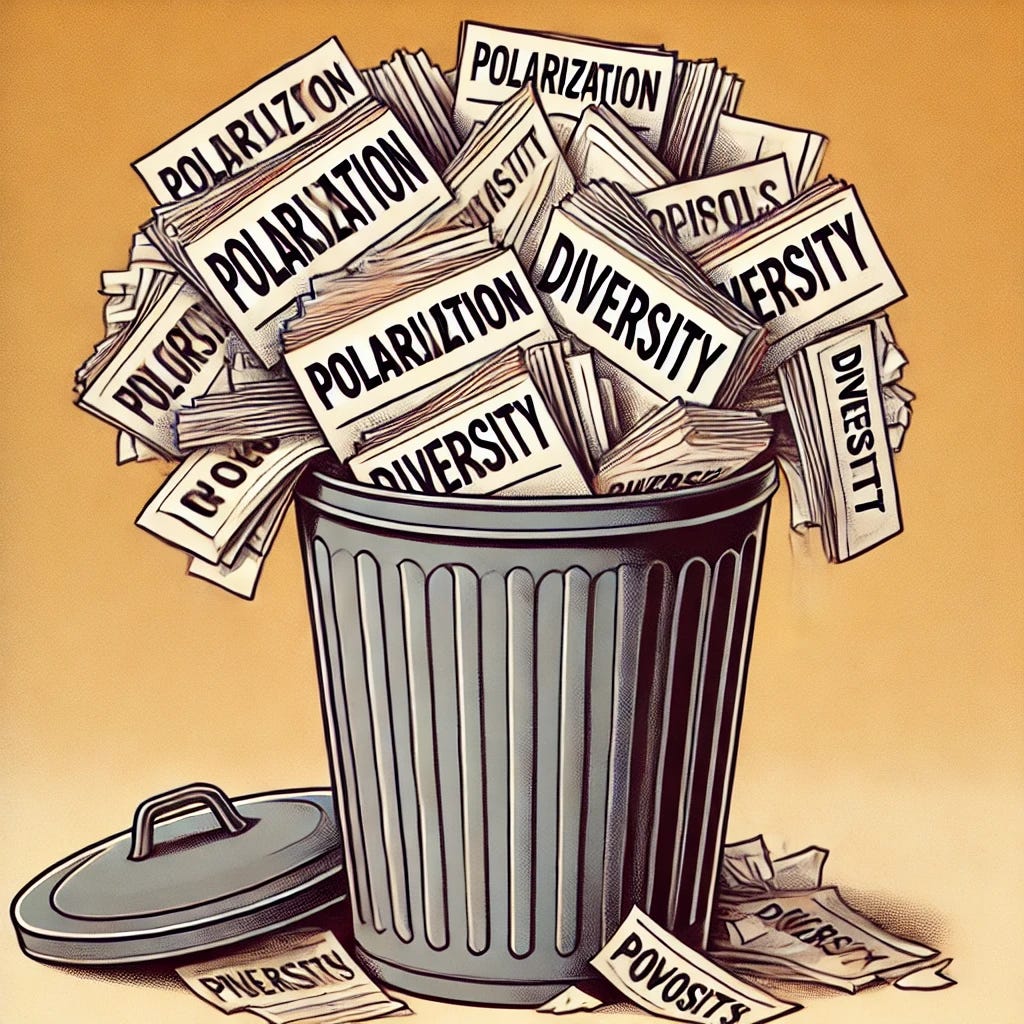Has “Polarization” Become Polarized?
Also: conservatives speak on climate, and science funding shouldn’t depend on keyword searches. – BCB #138
Bridge-building only works if people on both sides want to do it. Recently, a program director at the National Science Foundation told the New York Times that a new algorithm is being instituted to flag DEI-related words and phrases so that the agency can figure out which awards are supporting this work. “Polarization” is reportedly one of those words.
This is concerning. But perhaps it’s also an invitation for people who are interested in bridge-building to revisit the way we think and talk about it. Polarization has become polarized. We need new ways to think and talk about what divides us, and how we might come back together.
In a recent two-part article for The Fulcrum, James Coan and Sara Weinstein from More Like US suggest some ways that we might rethink the ways we talk about our divisions. Instead of “polarization,” Coan and Weinstein suggest we use two different portmanteaus:
“overthreat” and “undertrust.” Overthreat (overblown + threat) refers to an outsized perception of threat posed by people of another political party, and undertrust (underestimated + trust) refers to a lack of trust of people of different political parties due to an underestimation of factors that support trust. These concepts are closely linked, as overthreat exacerbates undertrust, and undertrust may lay the groundwork for overthreat.
Together, they cover nearly every issue of concern and remove risks of misunderstanding with the term polarization. The opposites of these words also provide clear and inherent direction for solutions to these problems: dethreatening and trust-building.
These two terms, they argue, largely cover all the bases of a word like “polarization” but allow for more nuance. “Threat” connotes perceived consequences on any level from society at large down to the individual, while still offering more specificity about what (real or perceived) factors are causing conflict. Trust also has multiple dimensions: horizontal trust between equals, and vertical trust between individuals and institutions or governments. Crucially, because the terms “overthreat” and “undertrust” are new, they aren’t politically loaded in the way that well-used words like “polarization” have unfortunately come to be.
Conservatives articulate their own climate change message
It’s no secret that climate change is a notoriously Blue issue (even though it probably shouldn’t be). But it seems that there are more and more Red voices starting to enter the conversation.
For example, republicEn, a community-building group devoted to advocating for conservative climate leadership, uses specifically Red-coded language to discuss climate change, framing tackling the issue around the ideas of innovation and competition for solutions. One of the organization’s major causes is imposing carbon tax, which they argue for as follows:
The small-government solution to climate change is simple accountability. Make all polluters accountable for the impacts of emissions by putting a price on those impacts. Sooty electricity, for example, would lose out to solar, wind, hydro and nuclear power—not because government picked them as winners, but because consumers would see that cleaner sources are actually cheaper when you consider the costs associated with burning fossil fuels. Self-interest and good economics would drive innovation—not fickle tax incentives, clumsy mandates or intrusive regulations.
RepublicEn primarily offers resources and support to conservatives, including legislators, who want to shape broader conversations around climate change. Interestingly, it’s a project of George Mason University’s Center for Climate Change Communication, which looks carefully at what kind of messaging tends to both build trust and actually bring about potential solutions to a problem that affects all Americans.
And they’re not the only ones. Last week in Washington, D.C., the Citizens’ Climate Lobby, a nonpartisan advocacy organization, convened its Conservative Climate Leadership Conference & Lobby Day. Between meetings with legislators and training sessions in persuasive communication, the event emphasized the singular opportunity that Republicans who care about the climate now have to make their voices heard:
Don’t miss your chance to be among the first to advocate for clean energy in the new Congress. With the Republican majority, right-leaning climate advocates are uniquely positioned to deliver this critical message.
If you’re going to defund “woke science” at least do it accurately
Ted Cruz, Chairman of the Senate Commerce Committee, recently published a list of grants awarded by the National Science Foundation under Biden that, he said, was funding projects that promoted DEI and other leftist causes. As Scott Alexander wrote in a subsequent Astral Codex Ten post, many scientists immediately complained that their projects on this list were not, in fact, woke—such as cancer research. Alexander hand-coded a sample of the list and found that 60% didn’t seem “woke” at all. So why had they been flagged?
After reading the hundred abstracts, I found a clear answer: people inserted a meaningless sentence saying “this could help women and minorities” into unrelated grants, probably in the hopes of getting points with some automated filter…
Some version of this sentence was in most of the nonwoke grants that made it into Cruz’s database. They promised to investigate some totally normal scientific topic, and then at the end they said somehow it would cause equity for women and minorities. I assume somebody told them that if they didn’t include this sentence, the Biden NSF would ding them for not having enough equity impact.
It’s troubling that so much funding for important research now seems to be in jeopardy. But, Alexander adds,
It reflects poorly on the Biden administration that you could only get a grant to cure cancer if you suggested you might teach an underrepresented minority child about it. But surely it also reflects poorly on the Republicans when they propose it for cancellation just because it did include the sentence about minorities. Just fund research to cure cancer without judging it on whether there’s a sentence about minority outreach in the grant proposal!
Image of the Week
(Source)



